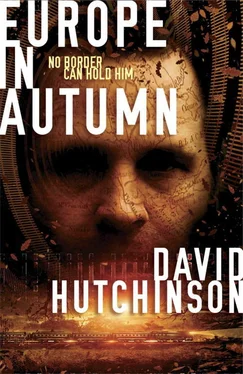“I’m not exactly dressed for it,” Rudi grumbled, still annoyed.
Fabio shrugged. “It’s Saturday. You were going to a football match when I called you. You were shopping with your fiancée. You were taking your maybe dog for a walk. Anyone asks, make something up, I don’t care.”
“This might work out a little better if we had some time to rehearse,” said Rudi.
“You don’t get a chance to rehearse for life, do you?”
“Don’t we have legends?”
“Well, I do, certainly.”
Rudi fought an urge to stop and yell at the top of his voice, which would have been noticed by all the cameras mounted around the Line’s border post. “Are you insane ?” he asked quietly.
Fabio sighed. “When you’re mugged and have all your money stolen, do you get a chance to rehearse?” he asked. “When one of your loved ones falls under a tram, do you get a chance to rehearse? No. When you’re in some godawful pocket nation and something goes cosmologically wrong with a Situation, will you have had time to rehearse? No.”
“I’ll at least have thought through the options beforehand.”
Fabio made a little pft sound of disdain. “You can never think through all the options. There are just too many. You’d go out of your mind trying to accommodate them all. Sometimes the only thing you can do is wing it.”
Rudi scowled. “Is this a test?”
Fabio shrugged. “Sure. Why not?” He tipped his head to one side and looked at Rudi critically. “I’ve told you all the stuff I know about this business. Whether I’ve taught you anything, I can’t say. Probably not. But I’m going through the wire now, and I need you to come with me, and I need you to be at the top of your game, inadequate though that may be. Whether you go with me or turn round and go back to being a cook, I’m going through the wire now.”
Rudi looked at the little Swiss and tried to think back to the point at which his life had ceased to make sense.
“I told you,” he said finally, “I’m a chef .”
The border post was a featureless brick cube embedded in the wire of the fence. It was simple, unadorned by national symbols, although a nest of cameras and aerials rose from its roof. There was a single door, on each side of which stood an armed Polish soldier. To one side of the building a road the width of a motorway ran up to an enormous sliding gate in the fence. More armed soldiers stood at attention at the gate. The whole thing made the border post between Poland and Hindenberg look as inviting as an ivy-decked roadside auberge .
A queue of people snaked up to the door of the building, but Fabio just walked up the line and waved his passport at one of the soldiers guarding the door. “Afternoon, Piotr,” he said as he went past. “How’s the wife? Oh, this is Rocco, my personal assistant. I wouldn’t let him through, if I were you. Very dubious character, our Rocco, ha ha. Show Piotr your passport, Rocco, you halfwit.”
Conscious of the eyes of the guard on him, and a tidal wave of grumbling from the queue behind him, Rudi took out his passport and held it up. He attempted, but did not quite manage, a reassuring smile, but all Piotr did was wave him through and he followed Fabio into the border post.
Fabio was halfway down the narrow corridor beyond the door. Rudi hurried to catch up and give the little Swiss a piece of his mind, but as he did Fabio turned and said heartily, “Come on, Rocco, I told you to keep up, didn’t I? You think I’m paying you by the hour or something?” and Rudi realised that everything said and done in the building was being recorded, probably by instruments of obscene sensitivity.
“I’m sorry, Herr Rausching,” he said humbly, trying to build himself a legend from scratch.
The room at the end of the corridor was Polish customs and immigration. A single officer of the Polish border guard sat looking bored behind a desk, but he brightened up when he saw Fabio approaching.
“Good afternoon, Herr Rausching,” he said cheerily when Fabio and Rudi reached the desk.
“Good afternoon, Przemek.” Fabio was all goodhumoured motion and bonhomie, like a three-card monte expert. “You’re well?” Case in hand, patting his pockets to find his passport. “The family?” Case on desk, searching his pockets. “Good man, good man.” Extracting his passport and handing it over. “I spoke with my friend about Agata’s school the other day; we should hear something in the next week or so.” Patting the case. “Do you need to look through this? Oh, by the way, meet Rocco, my personal assistant. A criminal; you only have to look at him, don’t you? Ha ha. Give Przemek your passport, Rocco.” Case on floor.
Rudi handed over his passport. Przemek fed them both into a reader on the desk, checked the results on a monitor, handed them back and bade them both a good day. Fabio picked up his case and beckoned Rudi to follow.
Walking down the corridor beyond the room, Rudi had to fight the urge to turn and look back and wonder whether he had imagined what he had just seen. For a moment, he wondered if he was not, in point of fact, in the presence of greatness.
The next room was the Line’s customs and immigration. It was identical to the Polish one, except behind the desk in this room sat a small and very blond young man wearing a severe but very comfortable-looking black uniform.
“Lars,” said Fabio. “Good afternoon.” For Lars, he modulated his performance. Very little smalltalk, very little business with the case, no reference to his ‘criminal’ personal assistant. For Lars, as far as Rudi could discern, Fabio did the whole thing with body language. From an operational standpoint, it was a privilege to witness. How had the British ever been able to hold Fabio? Why hadn’t he just walked out of their country? “Yes, hello, Gerald. How’s the family? Good. I’m just going to Poland, okay? Fine. Good man. See you again sometime.”
Emerging into the sunshine on the other side of the building, Rudi felt his head spin for a moment. Obviously, Fabio had passed this way many times before, scoping out the jump, pressing the flesh, gently subverting the guards, but it didn’t alter the fact that he had just basically talked them both through a border on false papers and with nobody on either side of the wire examining his case. Rudi thought that, even if they hadn’t had passports, Fabio would have managed to get them through anyway.
“Still there, Rocco?” Fabio asked with a little smile. “Good man. Keep up.”
“Yes, Herr Rausching,” said Rudi.
“This shouldn’t take long, and then you can go back to your football match.”
“I was shopping with my fiancée,” Rudi said automatically, and then wondered where that had come from.
Fabio, though, nodded fractionally as if in approval. “You’ll give my apologies to…?”
Rudi said the first name that came into his head, “Danuta,” and then worried that he wouldn’t be able to remember it if the subject came up in conversation again.
“Danuta,” Fabio repeated. “Are you ever going to make an honest woman of her, Rocco?”
“Probably, Herr Rausching.”
“And you’ll invite me to the wedding? No nonsense about me being best man; I can’t stand all that stuff. I’ll just stand at the back and wish you well.”
“Yes, Herr Rausching.” At that moment, Rudi would have followed Fabio to the gates of Hell. Where Fabio would no doubt have talked his way past the Devil, and then back out again, without even getting mildly singed.
Instead, what he did was follow Fabio across a wide gravelled area to a modest three-storey stuccoed building with orange roof tiles. Beyond the building there was more fencing, and through this Rudi could see a rank of railway tracks and switching stations, and two huge turntables for turning locomotives around, and a single Line train, sleek and blue and green and thirty or forty cars long and powered, if you believed the stories, by twin fusion tokomaks, although fusion power was still an infant and basically explosive science.
Читать дальше







